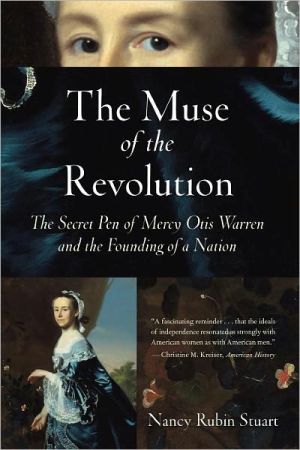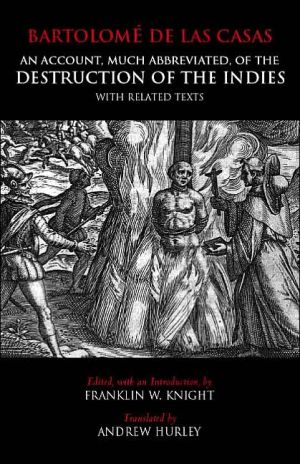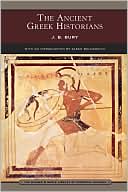The Muse of the Revolution: The Secret Pen of Mercy Otis Warren and the Founding of a Nation
Praised by her mentor John Adams, Mercy Otis Warren was America's first woman playwright and female historian of the American Revolution. In this unprecedented biography, Nancy Rubin Stuart reveals how Warren's provocative writing made her an exception among the largely voiceless women of the eighteenth century.
Search in google:
Praised by her mentor John Adams, Mercy Otis Warren was America’s first female historian of the American Revolution and the first American woman playwright. In this unprecedented biography, Nancy Rubin Stuart reveals how Warren’s provocative writing made her an exception among the largely voiceless women of the eighteenth century. Publishers Weekly This commendable biography follows the life of New England patriot Mercy Otis Warren (1728-1814), the celebrated-and sometimes reviled-writer of poems, plays, history and satire. Drawing heavily on correspondence as well as Warren's published writings, Stuart traces her unusual education in provincial Massachusetts, loving marriage to James Warren, on-again off-again friendship with John and Abigail Adams, literary rise and controversial antifederalist views after the Revolution. Warren emerges as a fully fleshed-out woman with literary insecurities, intractable opinions and a high-strung temper as well as deep affection for her husband and sons. Stuart includes fascinating period details, focusing primarily on Warren's home-front experiences of rampant inflation, scarcity of goods, high taxes and profiteering during the Revolution as well as typical 18th-century illnesses and family anxieties. Most poignantly, Stuart depicts Warren's loneliness and despair after the deaths of three of her five sons. This account is valuable as an eyewitness play-by-play of the American Revolution and will be a great resource to scholars of women's and literary history. 6 b&w illus. (July)Copyright © Reed Business Information, a division of Reed Elsevier Inc. All rights reserved.
The Muse of the Revolution\ The Secret Pen of Mercy Otis Warren and the Founding of a Nation \ \ \ By NANCY RUBIN STUART \ BEACON PRESS \ Copyright © 2008 \ Nancy Rubin Stuart\ All right reserved.\ \ ISBN: 978-0-8070-5516-8 \ \ \ \ \ Chapter One A Pen As Explosive As Gunpowder \ INITIALLY, MERCY OTIS WARREN was overwhelmed by the invitation, which arrived in Plymouth on a chili, snowy day in late December 1773, written in the familiar hand of John Adams.\ The letter, addressed to Mercy's husband, James, merchant-farmer and high sheriff of Plymouth County, included a special message for her: "Make my compliments to Mrs. Warren and tell her that I want a poetical genius -to describe a late frolic among the sea nymphs and goddesses. I wish to see a late glorious event, celebrated by a certain poetical pen, which has no equal ... in this country."\ John's mention of a "late glorious event" was that moonless night of December 16, 1773, when a dozen citizens disguised as Mohawk Indians boarded three British ships and dumped ninety thousand pounds of tea into Boston Harbor. The next morning, Bostonians congregated at an enormous elm known as the Liberty Tree, celebrating what would later be called the Boston Tea Party.\ Grim repercussions would follow, but relations with the Crown were already brittle. At issue was a long list of grievances-above all, the collection of nonrepresentative taxes. In May 1773, years after the repeal of the despised Stamp Act, Parliament had passed the Tea Act, creating a monopoly for the sale of tea from the British-owned East India Company over tea sold by American merchants.\ It was an outrage, the citizens grumbled, still another Parliamentary scheme to stifle the rights of the colonists. Tea, imported in ships from Great Britain's Indian colony and transported across the Atlantic to Boston's seaport, the busiest in North America, was a staple of the colonial hearth and home.\ A decade earlier, a cadre of colonial protestors, led by Samuel and John Adams, Mercy's brother Jemmy, her husband, James, and other Sons of Liberty, had organized protests against Britain, splitting Boston into two camps.\ Since then, the rebels, or Whigs, had seethed over British-controlled cargo taxed at Boston's wharves and the chink of hard currency paid at the exchange, which was sent overseas and swallowed in Britain's voracious maw.\ Pitted against the Whigs were those later known as Tories, men who easily accepted the rewards for British rule-fine furniture, fabrics, silk, sugar, and molasses-deeming them more important than arguments over citizen rights. Repeatedly, since the 1760s, those political differences had exploded into angry confrontations, stirring animosities in taverns, coffee houses, the silken drawing rooms of Beacon Hill, and the Massachusetts Assembly.\ Throughout the colony, the Whigs and Tories clashed over the concept of their right to self-government-conflict stirred north of Boston, in port towns such as Salem and Marblehead; in its western agricultural centers of Springfield and Worcester; and on Boston's South Shore, in communities such as Braintree and Plymouth, where the Adamses and Warrens lived.\ As the wife of James Warren, the wiry, dark-eyed Mercy had witnessed the seeds of that dissension at close hand. Rarely a month passed in Plymouth without the arrival of John or Sam Adams or other Sons of Liberty plotting their next move against British authority, while partaking of what Abigail Adams once described as "Colonel Warren's famed hospitality."\ The source of that hospitality, the Warrens' gambrel-roofed house with large windows and a central chimney on the corner of North and Main streets, was a stone's throw from old Plymouth Rock. Before the fireside in the Warrens' front parlor, Mercy served as hostess, witness, and confidante. It was there that John Adams came to know her, to warm to her intelligence and literary abilities.\ By January 1774, Mercy felt obliged nevertheless to reject Adams's proposal for a poem on the dumping of the tea. While she had already published two satirical, anti-British plays, the idea for a poem, as Mercy reminded Abigail on January 19, had originated with John. Therefore, it was best if he applied "his own genius for the completion."\ John never responded to her message. A shrewd judge of character, he knew he had stirred Mercy's literary appetites. Within a few weeks, she composed a whimsical fantasy about the Boston Tea Party that John published anonymously on March 21 in the patriotic Boston Gazette. Years later, Mercy would reprint that work as "The Squabble of the Sea Nymphs; or the Sacrifice of the Tuscararoes" in her collected works.\ The satire was not only better than John's original "clumsy, undigested" idea, he later observed, but "one of the incontestable evidences of real genius." Warren's wife was brilliant, an exception to most other women, much like his own beloved wife, Abigail.\ Mercy came by her radical ideas naturally, for her family, the Otises of West Barnstable, had long clashed with British authorities. The instigator was her eldest and favorite brother, James "the Patriot" Otis, an attorney, who, in 1761, protested to the Massachusetts Superior Court that "taxation without representation" was unconstitutional. It was then, observed young attorney John Adams, that "the child of independence was born."\ During the turbulent years that followed, Mercy realized that her words could also be as explosive as gunpowder. While they might not ignite muskets and cannons, they might stoke smoldering civic resentments into an open flame.\ By the time hostilities exploded at Lexington and Concord, Mercy had evolved into the secret pen of the American Revolution. Yet she had done so only haltingly, for women, who were seldom educated as well as men, were discouraged from politics. Their knowledge, consequently, as Mercy once ruefully reminded John, "is circumscribed within such narrow limits, and the sex too often forbidden to taste the golden fruit."\ The best colonial women could do was prepare that fruit for their men in their capacity as wives, mothers, and aunts, as spinners, embroiderers, cooks, and nurses. Theirs were the worn hands that guided the creaking wheel of eighteenth-century family life.\ Mercy was no exception. To outward appearances, she was a model wife to James Warren-petite, elegant, gracious, the mother of five sons. At the time that Mercy's "The Squabble of the Sea Nymphs" appeared on the front page of the March 21, 1774, Boston Gazette, most of her forty-six years had been spent raising sons, spinning, sewing garments, and stocking her larder, pantry, and root cellar for the arrival of unexpected guests and the inevitable chill of a New England winter.\ In 1763, eleven years before the Boston Tea Party, native Bostonian John Singleton Copley painted the Warrens. James appeared as an amiable, gentleman-farmer wielding a walking stick. Mercy is pictured more vibrantly, as a slight, warm, but plain-featured woman in a blue ruffled gown, staring intently ahead, her hands hovering over a nasturtium.\ Copley's flower may have been more than mere artistic convention, for during the 1760s Mercy was writing nature poetry, a seemingly innocuous pastime for the wife of a country squire.\ But by 1773, the docile matron was transformed. No longer would she remain mute about British efforts to "prove the people the property of arbitrary and distant lords." Over the next thirty-five years, Mercy secured her role as the nation's first eyewitness recorder of events; she produced political poems, satirical plays, an essay advocating a Bill of Rights, and the three-volume History of the Rise, Progress and Termination of the American Revolution. Her strong beliefs, captured in print, made her the muse of the Revolution.\ In late summer, when sprays of purple loosestrife, goldenrod, and ripening cranberries burst into color along the old road cutting through the Great Marsh of West Barnstable on Cape Cod, the air vibrated with the drumbeat of cicadas, the caws of seagulls and geese. To the north of Old King's Highway stood the Otis homestead, a spacious three-dormered mansion.\ There, just after the autumn equinox on September 14, 1728 (by the Old Style calendar, and September 25 by the modern one), in the "borning room" near the kitchen fireplace, Mercy Otis first opened her eyes. The infant was the third child and first daughter of Mary Allyne Otis and James Otis, a merchant, attorney, and local judge, famous for his hospitality and fondness for ideas.\ Mercy's parents probably met in Wethersfield, Connecticut, where Mary Allyne's father, Joseph, a sloop owner, relocated the family from Plymouth during her girlhood. In 1724, twenty-two-year-old Mary met and married young James Otis and moved into his family's home in West Barnstable, Massachusetts.\ Over the next two decades, the couple produced thirteen children, seven of whom survived. No details are preserved beyond the date of Mercy's birth, for as a colonial female, her life was expected to be as anonymous as the era's needlework. Preceding Mercy were two brothers, the restless, dark-eyed James, Jr., nearly three years her senior, and Joseph, born in March 1726.\ Their mother, Mary Allyne, a descendant of Pilgrim stock, had strict religious inclinations. Her great-grandfather was Edward Dotey, an indentured servant who attempted mutiny on the Mayflower, but, after a duel, became a peaceful citizen of Plymouth Plantation.\ Little is known about Mercy's relationship to Mary Allyne. Copley's portrait of 1760 depicts her as a sturdy, practical-looking matron, uncomfortably stuffed into a corset and dark silks. A bible sat on the adjacent table, possibly representing Mary Allyne's ability to read and instruct her children.\ Mercy, who often memorialized her loved ones in poems, never wrote about her mother. Years after Mary Allyne's death in 1767, the author described her to a young woman simply as a "mother in whom was concentered every excellent quality that could endear her to her family and secure her ... many friends."\ In a letter to Janet Montgomery, the widow of the Revolutionary War hero Richard Montgomery, Mercy recalled that her mother always had some "instructive precept" for her children. Even considering the New England tendency for understatement, Mercy's words seem more dutiful than affectionate. Scholarly theory suggests that Mary Allyne's childbearing years, punctured so tragically with six infant deaths, made her a moody, remote, and possibly even depressed, parent.\ Mercy's father, James, was altogether different. An affable man whose great-grandfather came from Devonshire, England, in 1621, James had increased his father's farmlands in Barnstable and his retail shop with supplies of pickled fish, West Indian rum, and British silks, wools, and ribbons. A self-taught lawyer and member of Barnstable's local militia, James was a judge of the district court.\ In 1727, after James's father, John Otis III, died, he inherited the Otis homestead, the spacious fields bisected by Old King's Highway-today's Route 6A-as well as the barn, hayfield, and orchard facing Sandy Creek near the Great Marsh. For all his wealth, stature, and loyalty to the English Crown, James had a lively Whiggish, or democratic, spirit, a man who litigated the petty crimes and homicides of Barnstable's poor whites and indentured servants as well as the property disputes of more prosperous citizens.\ That James lacked a formal education mattered little to his admiring clientele. "I'll give you double for coming," an Eastham resident promised James if he took his case. A plaintiff from Dartmouth begged him to desist from litigation. A third, a Harvard man and capable attorney himself, pleaded with James to defend his Taunton client.\ To expand his practice, James rode the court circuit along the dusty roads of the Cape as far east as Chatham and as far west as Scituate. By 1734, Mercy's father had met James Warren, Sr., high sheriff of Plymouth County and fellow merchant-farmer, who occasionally witnessed his legal papers.\ The Otis farm was supervised by a foreman and manned by a staff of laborers and indentured servants, several of them American Indians and at least one an African American slave. At the noon dinner hour, the field workers, in accordance with rural tradition, ate either in the kitchen or with the family in the dining room.\ That daily contact with Barnstable's working class gave Mercy an appreciation of ordinary people. While independence from British rule became a "plant of later growth," as she wrote in her History of the Rise, Progress and Termination of the American Revolution, Mercy's childhood had already introduced her to the frustrations of the disempowered.\ Enhancing the close relations between the Otises and other residents of West Barnstable was the location of their homestead near the village center. Across the road, near some of their own fields, stood the home and farm of their neighbors the Hinckleys. A gristmill and tavern lay to the west, where mail, carried by travelers from Boston and Plymouth, was left for local residents.\ Central to the life of that quiet seaside hamlet was the West Barnstable Meeting House, a stark two-storied white clapboard building with a sixty-foot bell tower and a rooster weathervane. Built in 1719 for community meetings and used as a church on Sundays, it remains one of the few such structures still standing in New England.\ Further east on the old county road lay the burial ground of the community's earliest white settlers, who had arrived there from Scituate in 1639. To the north, opposite Barnstable harbor, was a seven-mile stretch of beach known as Sandy Neck, where wigwams housed the Wampanoag.\ Most handsome of all the West Barnstable residences was the Otises' triple-dormer wood-framed "mansion," admired for its grand stairway and wainscoted walls. In summer, the home was shaded by enormous buttonwood trees; in winter, it was heated by large fireplaces burning more than fifty cords of wood.\ Richly furnished with mahogany cabinets, chests, gilded mirrors, damask-covered tables, and fine plate, the homestead also contained a tall case clock, the first in Barnstable County. The cellar was stocked with barrels of West Indian rum, pipes of Madeira, and fine European wines. At dinner, the table groaned with standing ribs, mutton chops, cranberries, apples, pears, and vegetables harvested from the Otises' fields, as well as cod and oysters from nearby shores. Once the day's business was done, James invited visitors to his sitting room or for supper with his family.\ According to young John Adams, who once rode circuit court with Mercy's father from Taunton to Milton, James Otis, Sr., was "vastly easy and steady in his temper ... good-humored and sociable and sensible." Yet beneath James's affability and prominence lurked discontent-in contrast to his brothers, Mercy's father lacked a formal education, and this embarrassed him as an adult.\ His more erudite colleagues apparently agreed. "Learned he is not," as John Adams diplomatically noted.\ To compensate, Mercy's father decided that his sons must be well educated-especially his two eldest, James, Jr.-or Jemmy, as he was known -and Joseph. The lads would profit from the education their father never had by attending Harvard College or the college at Cambridge.\ Neither the local dame school where little children, including girls like Mercy, were sent, nor the Barnstable grammar school for older boys, would suffice. By the time Jeremy and Joseph were seven or eight, they crossed Old King's Highway and walked down Hinckley Lane to the parsonage where James's brother-in-law Rev. John Russell, pastor of the West Barnstable church, tutored them.\ Kin relations were not the only reason why Mercy's father chose Rev. Russell. A graduate of Yale College, the minister was learned as well as respected for his piety. In recompense, Mercy's father provided him with the wheat, vegetables, and fruit grown on the Otis farm.\ During the eighteenth century, even well-born girls like Mercy were expected to assist with maintenance of the home. By the age of four, a girl knew how to sew clothes and knit a pair of stockings; by five or six, she learned needlework and embroidery. Colonial girls helped with other household duties as well. Among these was the preparation of meals in heavy pots or on spits in the open-hearth fireplace, baking in Dutch ovens, churning butter, boiling clothes with lye and bleach, and stirring hot vats of grease for soap.\ Prosperous matrons like Mary Allyne Otis supervised such tasks and often pitched in themselves. That was not always possible for Mercy's mother. By 1730, with three youngsters under the age of six, she birthed a second daughter, Mary, followed in 1732 by a third, Hannah. By the time Mercy was eleven, her mother had delivered three more-Nathaniel, Martha, and Abigail. The first two died as infants.\ (Continues...)\ \ \ \ \ Excerpted from The Muse of the Revolution by NANCY RUBIN STUART\ Copyright © 2008 by Nancy Rubin Stuart. Excerpted by permission.\ All rights reserved. No part of this excerpt may be reproduced or reprinted without permission in writing from the publisher.\ Excerpts are provided by Dial-A-Book Inc. solely for the personal use of visitors to this web site.\ \
Preface xiPart I Daughter of Liberty1 A Pen As Explosive As Gunpowder 32 Fires, Civil and Domestic 193 "Neither the pen nor the tongue of a lawyer" 334 The Patriots' Secret Pen 455 "No one has at stake a larger share of domestic felicity" 576 "Perhaps the whole land be involved in blood" 69Part II Conscience of the Revolution7 Reporter of Revolutionary Events 838 A Still Calm Within, Violent Concussions Without 979 "Ladies are the greatest politicians" 10910 "The hand often shrunk back from the task" 12111 "War has ever been unfriendly to virtue" 133Part III The Patriot Historian12 Views from Neponset Hill 14713 Hope Is an Airy Queen 15914 The Public Is a Monster Seldom Guided by Reason 17115 "The fair fabric of a free, strong and national republic" 18316 "Too federal to talk freely" 195Part IV Penwoman to Posterity17 "A sister's hand may wrest a female pen" 20918 "Alas, humiliated America!" 22119 A Sea Change in Party Politics 23320 "In the spirit of friendship" 24521 "Blessed are the peacemakers!" 257Acknowledgments 269Notes 273Bibliography 287Index 299
\ Publishers WeeklyThis commendable biography follows the life of New England patriot Mercy Otis Warren (1728-1814), the celebrated-and sometimes reviled-writer of poems, plays, history and satire. Drawing heavily on correspondence as well as Warren's published writings, Stuart traces her unusual education in provincial Massachusetts, loving marriage to James Warren, on-again off-again friendship with John and Abigail Adams, literary rise and controversial antifederalist views after the Revolution. Warren emerges as a fully fleshed-out woman with literary insecurities, intractable opinions and a high-strung temper as well as deep affection for her husband and sons. Stuart includes fascinating period details, focusing primarily on Warren's home-front experiences of rampant inflation, scarcity of goods, high taxes and profiteering during the Revolution as well as typical 18th-century illnesses and family anxieties. Most poignantly, Stuart depicts Warren's loneliness and despair after the deaths of three of her five sons. This account is valuable as an eyewitness play-by-play of the American Revolution and will be a great resource to scholars of women's and literary history. 6 b&w illus. (July)\ Copyright © Reed Business Information, a division of Reed Elsevier Inc. All rights reserved.\ \ \ \ \ Library JournalWhen Americans ready themselves for a national election, they tend to take a closer look at their government and its leaders, present and past. Readers should not limit themselves to the Founding Fathers: the Founding Mothers should be studied as well. Stuart (American Empress: The Life and Times of Marjorie Merriweather Post) reminds us that the U.S. Constitution-notably the Bill of Rights-carries Mercy Otis Warren's fingerprints as much if not more than those of most constitutional delegates. Mercy was not only the daughter, sister, wife, and mother of legendary patriots but also a patriot and intellectual in her own right who sparred with John Adams and whose voice was heard in an era of usually "silent" women. The author of plays, poems, and, finally, History of the Rise, Progress and Termination of the American Revolution, Mercy is someone, as Stuart's work absolutely confirms, we should all know better. This wonderfully researched and readable book has done an excellent job of giving another view of what it took to make this country. Essential for academic and public libraries. Enjoy!\ —Suzanne Lay\ \ \ \ Kirkus ReviewsHyperbolic biography of the Massachusetts patriot and author, told largely through her correspondence with John and Abigail Adams. Stuart (The Reluctant Spiritualist: The Life of Maggie Fox, 2005, etc.) longs to discover in Mercy Otis Warren (1728-1814) a long-lost feminist heroine, and her overeagerness is palpable in such breathless section titles as "Conscience of the Revolution" and "Penwoman to Posterity." Yes, Warren was the author of numerous popular satirical plays that criticized the British, as well as a three-volume history of the American Revolution. But she was first and foremost a devoted wife and mother who came to her patriotic ideals largely through her firebrand brother James ("taxation without representation is tyranny") and their father, a merchant and judge in West Barnstable, Mass., who had long clashed with British authorities. She and husband James Warren, the high sheriff of Plymouth County, were swept up in the events of the early rebellion, clashing in particular with loyalist governor Thomas Hutchinson. They hosted Sons of Liberty gatherings, Mercy composed a mock epic entitled "The Squabble of the Sea Nymphs" on the occasion of the Boston Tea Party, and James became president of the Provisional Congress after Bunker Hill. The revolution won, the Warrens moved aside from the political mainstream, feeling that the old patriotic, Puritan values were giving way to new money, profiteering and materialism. Though John Adams had urged her to write it, History of the Rise, Progress and Termination of the American Revolution (1805) assessed the presidency of her neighbor and literary mentor in moderately unflattering terms, putting an eight-year damper on theirfriendship. Abigail Adams remained in touch with Mercy, and Stuart emphasizes throughout her account that notable women such as these were relegated to the wings, passing frenzied notes to their men taking action at center stage. A valiant resurrection of an important early American author. Agent: Patty Moosbrugger/Stuart Krichevsky Literary Agency\ \








